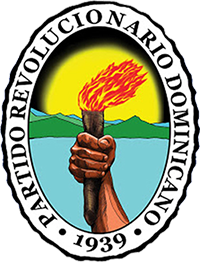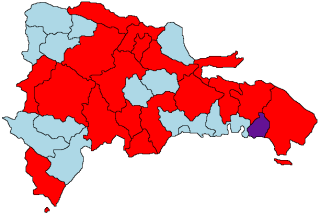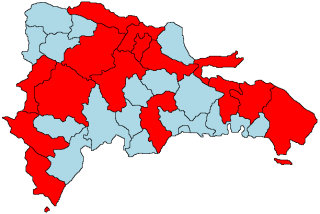
Presidential elections were held in the Dominican Republic on 16 May 2004. The result was a victory for former president Leonel Fernández, who defeated incumbent Hipólito Mejía. Voter turnout was 72.8%.

The Social Christian Reformist Party is a Christian democratic right-wing political party in the Dominican Republic. It was established on July 24, 1984, by the union of Joaquín Balaguer's Partido Reformista and the Partido Revolucionario Social Cristiano. Some of the PRSC's founders and leaders were originally business leaders and Roman Catholics who opposed the communist, socialist, and social democratic tendencies of Juan Bosch, the Dominican Revolutionary Party (PRD) and the Dominican Liberation Party (PLD).

The Dominican Liberation Party is a political party in the Dominican Republic. Founded in 1973 by former president Juan Bosch, the party, along with the Dominican Revolutionary Party, and Social Christian Reformist Party, has dominated politics in the country since the establishment of democracy in the early 1960s.

The Dominican Revolutionary Party is a political party in the Dominican Republic. Traditionally a left-of-centre party and social democratic in nature, the party has shifted since the 2000s toward the political centre. The party's distinctive color is white. Traditionally, the party has two presidents: the "Titular President" and the "Acting President" ; until 2010 the presidents and the Secretary-General were proscribed to run for any elected office.

José Francisco Peña Gómez was a politician from the Dominican Republic. He was the leader of the Dominican Revolutionary Party (PRD), a three-time candidate for president of the Dominican Republic and former Mayor of Santo Domingo. He is considered, along with Joaquín Balaguer and Juan Bosch, as one of the most prominent Dominican political figures of the 20th century.

The Italian Socialist Party was a social-democratic and democratic-socialist political party in Italy, whose history stretched for longer than a century, making it one of the longest-living parties of the country. Founded in Genoa in 1892, the PSI was from the beginning a big tent of Italy's political left and socialism, ranging from the revolutionary socialism of Andrea Costa to the Marxist-inspired reformist socialism of Filippo Turati and the anarchism of Anna Kuliscioff. Under Turati's leadership, the party was a frequent ally of the Italian Republican Party and the Italian Radical Party at the parliamentary level, while lately entering in dialogue with the remnants of the Historical Left and the Liberal Union during Giovanni Giolitti's governments to ensure representation for the labour movement and the working class. In the 1900s and 1910s, the PSI achieved significant electoral success, becoming Italy's first party in 1919 and during the country's Biennio Rosso in 1921, when it was victim of violent paramilitary activities from the far right, and was not able to move the country in the revolutionary direction it wanted.

Guatemalan Christian Democracy was a political party in Guatemala. A moderate, reformist and anti-Communist party, it was a member of Christian Democrat International.
The Social Democratic Institutional Bloc is a left-wing populist, democratic socialist, social democratic and left-wing nationalist political party in the Dominican Republic.
The Grand National Alliance, commonly known as the "Alianza Rosada", was a one-time electoral alliance in the Dominican Republic. The alliance was led by the Dominican Revolutionary Party (PRD) and the Social Christian Reformist Party (PRSC). It lost the 16 May 2006 legislative elections.
The Liberal Reformist Party, formerly Liberal Party of the Dominican Republic is a liberal political party in the Dominican Republic. The party was originally named La Estructura, the name under which it contested the 1986 general elections as part of an alliance with the defeated Dominican Revolutionary Party. For the 1990 elections it changed its allegiance to the victorious Social Christian Reformist Party. For the 2006 elections it was part of the victorious Progressive Bloc.
The People's Democratic Party is a minor political party in the Dominican Republic. It first contested national elections in 1974, when it provided the main opposition to the ruling Reformist Party due to the Dominican Revolutionary Party not contesting the elections. Its candidate, Luis Homero Lajara Burgos, received 15% of the vote in the presidential election, whilst the party won three seats in the House of Representatives. In 1978 many of the opposition parties returned to the electoral scene. Lajara Burgos received only 0.4% of the vote in the presidential election, whilst the party lost all three seats in the House of Representatives after a similar result in the Congressional elections.

The National Citizen Will Party, formerly known as the National Civic Veterans Party, is a minor Christian-democratic and social-conservative political party in the Dominican Republic. It was founded on 10 May 1973 by Sergeant Federico Marte Pichardo, under the initiative of then-President Joaquin Balaguer, and was renamed on 8 March 2015. It is currently directed by Juan Cohen.
The National Renaissance Party is a minor political party in the Dominican Republic. It first contested national elections in 1994, when it failed to win a seat. They again failed to win a seat in 1998, whilst their candidate received less than 1% of the vote in the 2000 presidential elections. For the 2002 elections it was part of the victorious Dominican Revolutionary Party-led alliance. It ran alone in the 2006 elections, but received only 0.1% of the national vote, failing to win a seat.
The Workers Revolutionary Party is a communist party in Namibia led by Attie Beukes and Harry Boesak.

General elections were held in the Dominican Republic on 16 May 1974. The main opposition party, the Dominican Revolutionary Party, did not contest the election, leaving only the ruling Reformist Party and some right-wing and centre-right parties. Incumbent Joaquín Balaguer won the presidential election, whilst his Reformist Party won the Congressional elections in alliance with the National Youth Movement. Voter turnout was 71.7%.

General elections were held in the Dominican Republic on 16 May 1986. Joaquín Balaguer of the Social Christian Reformist Party (PRSC) won the presidential election, whilst the PRSC-led alliance won the Congressional elections. Voter turnout was 72%.

General elections were held in the Dominican Republic on 16 May 1994. Joaquín Balaguer of the Social Christian Reformist Party won the presidential election, whilst the Dominican Revolutionary Party-led alliance won the Congressional elections. Voter turnout was 87.6%.

Presidential elections were held in the Dominican Republic on 20 May 2012. They were the fifth quadrennial elections for the presidency and vice-presidency since 1998, when a change in the electoral law separated the presidential from the congressional and municipal elections.

General elections were held in Dominican Republic on 15 May 2016 to elect a president, vice-president and the Congress, as well as 20 deputies to the Central American Parliament, municipal councils, mayors and vice mayors. On 15 May 2015 Roberto Rosario, president of the Central Electoral Board, said that there would be about 4,300 seats up for election in the "most complex elections in history".

General elections were held in the Dominican Republic on 5 July 2020 to elect a president, vice-president, 32 senators and 190 deputies. They had originally been planned for 17 May, but were postponed due to the coronavirus pandemic. They are the second elections since 1994 in which all positions will be elected simultaneously, and the first in Dominican history in which all authorities will be elected simultaneously and directly.













